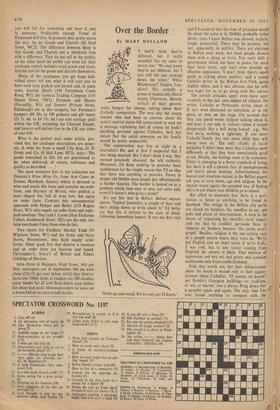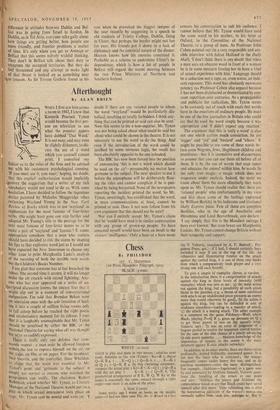Over the Border
By MARY HOLLAND
I DON'T think they're different, but I really wouldn't like my sister to marry one.' We may know they're not different, but I can still tell one walking down the street.' White Rhodesians? Empire Loy- alists? No, actually a group of impeccably liberal young Ulstermen, fiercely
critical of their govern- ment, hungry for change, talking about their Catholic compatriots. The next day the young teacher who had been so anxious about his sister's marital status felt constrained to send me a message explaining that of course he hadn't anything personal against Catholics, he'd just meant that the social pressures on his family would be pretty unbearable.
The conversation was late at night in a journalist's flat and at first I suspected that I was being mocked. But I don't think I was, they seemed genuinely obsessed, the talk cathartic. Moreover, I'd done nothing to provoke these confidences for the simple reason that I'd no idea that there was anything to provoke. Down in sloppy old Dublin most people jeer affectionately at border fanatics. The border is looked on as a problem which time may or may not solve and, even if it doesn't, who gives a damn?
It's not like that in Belfast. Before anyone sneers, 'Typical journalist, a couple of days and she's sitting down to write about it,' I'd better say that this is written in the state of shock following immediate impact. It was my first visit
'Make up your mind. We've only got 24 hours.'
and I'd assumed that the state of prejudice would be about the same as in .Dublin, probably rather better, since I knew Belfast was shrewd, realistic, tough, purposeful. There may be purpose, but not, apparently, in politics. There are elections in Belfast next week, but most people dismiss them with a shrug as farce. You can't shift a government which has been in power for more effective opposition. 'I don't think there's much, than forty years, you can't even provide an
point in talking about politics,' said a young Catholic writer in the Belfast Arts Club, going slightly white, and it was obvious that his wife was eager for, us to go along with this advice.
The ostrich attitudes apply even more spec- tacularly to the sad. sore subject of religion. No writer, Catholic or Protestant, writes about it. It isn't even discussed on television, or in the press, or seen on the stage. I'm assured that they can spend weeks without talking about it, and pour it out only to visitors-when it sounds dangerously like a boil being lanced: e.g., 'We feel we're walking a tightrope. If one more Catholic family has one more child they will sweep over us.' The only clichés of racial prejudice I didn't hear were that Catholics smelt differently or that they were sensationally good at sex. Mainly, the feelings seem to be economic. Ulster is emerging to a better standard of living, but there is still a chronic fear of unemployment and worry about housing. Advertisements for houses and situations vacant in the Belfast papers ask you to state name, age and religion. In the classier estate agents the accepted way of finding out is to ask where your children go to school.
But allied to economic fear there is a puri- tanism as fierce as anything to be found in Scotland. The swings in the Belfast city parks are closed on Sundays. So, needless to say, are pubs and places of entertainment. A man in the throes of organising his church's carol singers told me that he couldn't persuade them to rehearse on Sundays because 'the carols aren't gospel.' Besides, religion is the one certain root of a people unsure where their roots lie. 'We're not English and we don't know if we're Irish,' I was told, but to any visitor coming from England the answer is plain. That mixture of aggression and wry wit and gaiety and cynicism could come only from cradle Irishmen.
Irish they surely are, but their defensiveness about the South is second only to their aggres- siveness about Catholics. 'Of course, we haven't got Dublin's Georgian buildings-or tradition, or wit, or charm,' was a phrase flung down like a gauntlet again and again. The only time I've ever found anything to compare with the difference in attitudes betyveen Dublin and Bel- fast was in going from Israel to Jordan. In Dublin, as in Tel Aviv, everyone talks gaily about how things are getting better, how people are more friendly, and frontier problems a matter of time. It's only when you get to Amman or Belfast that this seems naïvely wishful thinking. They don't in Belfast talk about their duty to recapture the occupied territories. But they do feel threatened and any attempt to make light of that threat is looked on as something near is to treason. As Sir Tyrone Guthrie found to his
cost when he provoked the biggest rumpus of the year recently by suggesting in a speech to old students of Trinity College, Dublin, living in Ulster, that perhaps the border might not last for ever. His friends put it down to a lack of diplomacy and the convivial nature of the dinner. Heaven, knows how his enemies construed it. Probably as a scheme to undermine Ulster's in- dependence, which is how a lot of people in Belfast still ,regard the recent meeting between the two Prime Ministers of Northern and Southern Ireland.



































 Previous page
Previous page